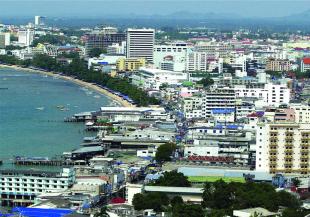

Thailand looks to domestic and GCC markets for tourism growth

As the destination recovers from airport protests and feels the pinch of the economic downturn, new primary source markets are targeted
Thailand is looking to source travellers from markets much closer to home in 2009 as the effects of the November airport protests and the global economic downturn take their toll on arrivals numbers to the popular Asian destination.
The country is looking to rely much more heavily on the local Thai market and is also eyeing the Middle East where outbound traffic has remained more resilient than in other markets.
With tourism contributing 5% of GDP and an 8.8% decline in international arrivals predicted by the Bank of Thailand for 2009 over 12.8 million arrivals in 2008, the country realises serious action is required to boost the appeal of the country and maintain growth.
During what is usually a peak tourist season from Christmas through to Chinese New Year (late January in 2009), the Thais were out in force in easy-to-reach destinations from Bangkok, such as Pattaya and Cholburi Province – all locations that are normally swarmed with international visitors at this time of year.
In a move that indicates the state of Thailand’s inbound market, Pattaya City has allocated a greater part of its 2009 marketing budget to promoting Pattaya and its nearby attractions to the Thai market, rather than internationally.
According to Thai Hotel Association president and Dusit Resort Pattaya general manager, Chatchawal Supachayanont, Pattaya will “always survive” because it boasts “a wide-reaching market base”.
to
“When the Asian market failed after the Tsunami, we welcomed more Russian and European guests. Now our European base is declining due to the worldwide recession, we will see more Thai visitors enjoying the benefit of finding a room during the peak season, the good weather on the Eastern Seaboard and the value-for-money that Pattaya represents,” he said.
Meanwhile, hotel chains such as Amari Hotels & Resorts, which enjoys year-round support from Thai tourists and corporate clients, is currently offering deals on corporate seminars and team-building weekends in the Amari Orchid Resort & Towers and switching marketing promotions to target “home grown” tourists during times of crisis.
Despite the focus on domestic tourism, Local Eastern Seaboard Tourism Authority of Thailand director Khun Nitti told ATN the Middle East would prove a key source market in 2009, with Pattaya City going ahead with plans to attend Arabian Travel Market in Dubai in May, with an increased delegation representing local attractions and hotels.
She said the public and private sectors both hoped that Middle Eastern arrivals would continue to grow, with the Eastern Seaboard benefitting from the close proximity of the International Airport – little more than one hour’s drive away – and the favourable exchange rates combined with special offers to entice travellers.
In fact, THAI Royal Orchid Family Getaway packages valid to the end of March 2009 have been launched in the UAE market.
The tour operator, part of Thai Airways, is offering two nights/three days in Bangkok from just AED 1780 per person with one child under 12 travelling for free when accompanied by two paying adults.
Flight-only prices start from AED 1080 (plus taxes and surcharges).
In addition, the Government of Thailand is currently considering waiving visa fees for those nationalities still requiring visas although many nationalities, including most Europeans and Gulf nationals, do not require visas for a stay of less than 30 days.